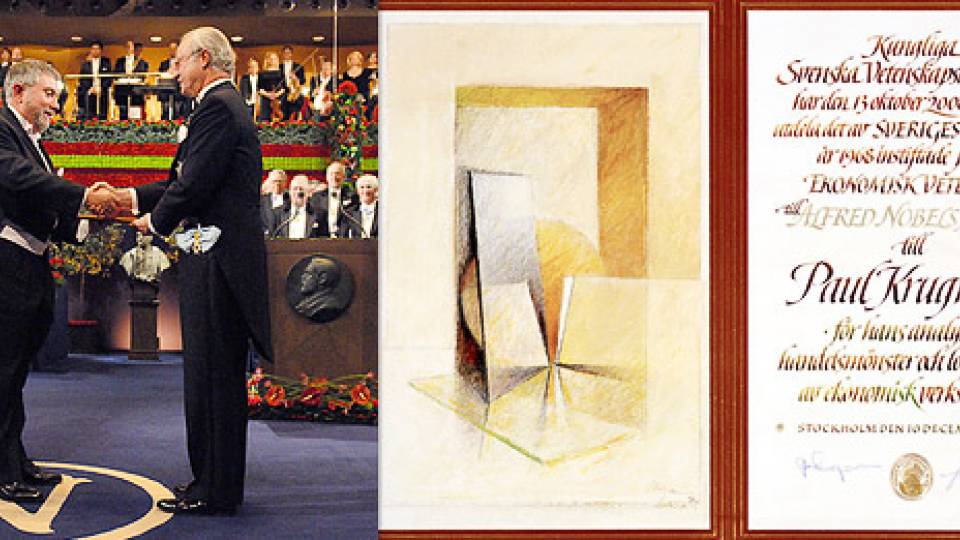Eric Maskin, one of three economists selected Oct. 15 to receive the Nobel Memorial Prize in Economic Sciences, has a Princeton University connection.
His permanent position is as the Albert O. Hirschman Professor of Social Science at the Institute for Advanced Study, which is located in Princeton but is not part of the University. Since 2000, he also has served as a visiting lecturer with the rank of professor in Princeton University's Department of Economics.
He is an internationally recognized authority on economic theory whose work has been drawn on extensively by researchers in industrial organization, finance, development and other fields in economics and political science. He works in many areas of economic theory, including game theory, the economics of incentives and social choice theory.
"He is part of the intellectual community in economic theory at Princeton," said Bo Honore, chair of the Department of Economics. "He attends the seminars and helps advise graduate students. He has been the adviser of some of our most promising graduate students."
Maskin, Leonid Hurwicz of the University of Minnesota and Roger Myerson of the University of Chicago were chosen to share the economics Nobel "for having laid the foundations of mechanism design theory."
"It is a thrill of a lifetime to have received such a recognition," Maskin said. "It is particularly thrilling to share it with two such distinguished colleagues. Leo Hurwicz is the father of mechanism design theory and has inspired much of my work, and Roger Myerson is an old friend and collaborator and a tremendous economist."
Mechanism design theory addresses situations in which markets do not work efficiently, such as when competition is not completely open, consumers are not fully informed or private interests are at work. "It has helped economists identify efficient trading mechanisms, regulation schemes and voting procedures. Today, mechanism design theory plays a central role in many areas of economics and parts of political science," the Royal Swedish Academy of Sciences noted in the prize announcement.
Stephen Morris, the Alexander Stewart 1886 Professor of Economics at Princeton, said, "Eric Maskin is one of the leading economic theorists of his generation, and mechanism design is one of the great success stories of economic theory of the last generation. Eric is a leading figure in the mechanism design revolution, showing how game theoretic ideas can be used to understand institutions small and large. As well as writing many of the seminal papers in this area, he has also been a leading figure in translating these ideas into economic applications."
Morris noted the University and the Institute for Advanced Study have played important roles in the history of game theory, which Maskin has continued to advance.
"The strong game theory group in Princeton's economics department today benefits from collaboration with Eric," Morris said, adding that Maskin is helping the department organize an academic conference on Princeton's campus next year in honor of the 80th birthday of Princeton Nobel laureate and game theory pioneer John Nash.
"Over the last three decades, Eric Maskin has made key contributions to most of the major fields of economic theory including, in particular, mechanism design theory," said Dilip Abreu, the Edward E. Matthews, Class of 1953, Professor of Finance. "The broad concern of this theory is the design of institutions in the presence of economic actors who have private information and incentives to conceal it. The applications of this theory -- many of which Maskin has taken a leading role in developing -- are ubiquitous.
"Maskin's presence is a great gift to the department. He plays a central role in the teaching and mentoring of our graduate students and is a powerful intellectual presence at our seminars," Abreu said. Maskin has taught courses during his time at the University, but is not teaching this semester.
Kareen Rozen, who completed her Ph.D. in economics from Princeton this spring and is now an assistant professor of economics at Yale University, said she was "privileged" to have Maskin as her main dissertation adviser.
"Eric is not only a brilliant researcher with an amazing breadth and depth of understanding, but he is also an incredible resource for students. I am endlessly amazed by his patience, caring and devotion to mentoring students, in spite of his already very busy schedule. Before I went on the academic job market this past year, Eric spent countless hours helping me to polish the presentation of my research papers; and in the years before he always made himself available to speak with me whenever I needed his advice," Rozen said.
"He is also a phenomenal lecturer and writer, known for his ability to make the most difficult of topics accessible. Eric's insistence on clarity and rigor has had a formative influence on the way that I think, write and present my own research," she said.
Gustav Sigurdsson, who earned his Ph.D. from Princeton in 2006 and is now an assistant professor of finance at the Wharton School of the University of Pennsylvania, said, "I feel incredibly fortunate to have had Eric as my dissertation adviser at Princeton. Through his encouragement, a term paper I wrote for his auction theory class grew into the basis for my entire dissertation. His dedication is extraordinary -- I am still amazed every time I receive his feedback on my work and find detailed line-by-line comments on long mathematical proofs."
Media seeking more information on Maskin should contact Christine Ferrara at the institute at (609) 734-8239 or cferrara@ias.edu.






